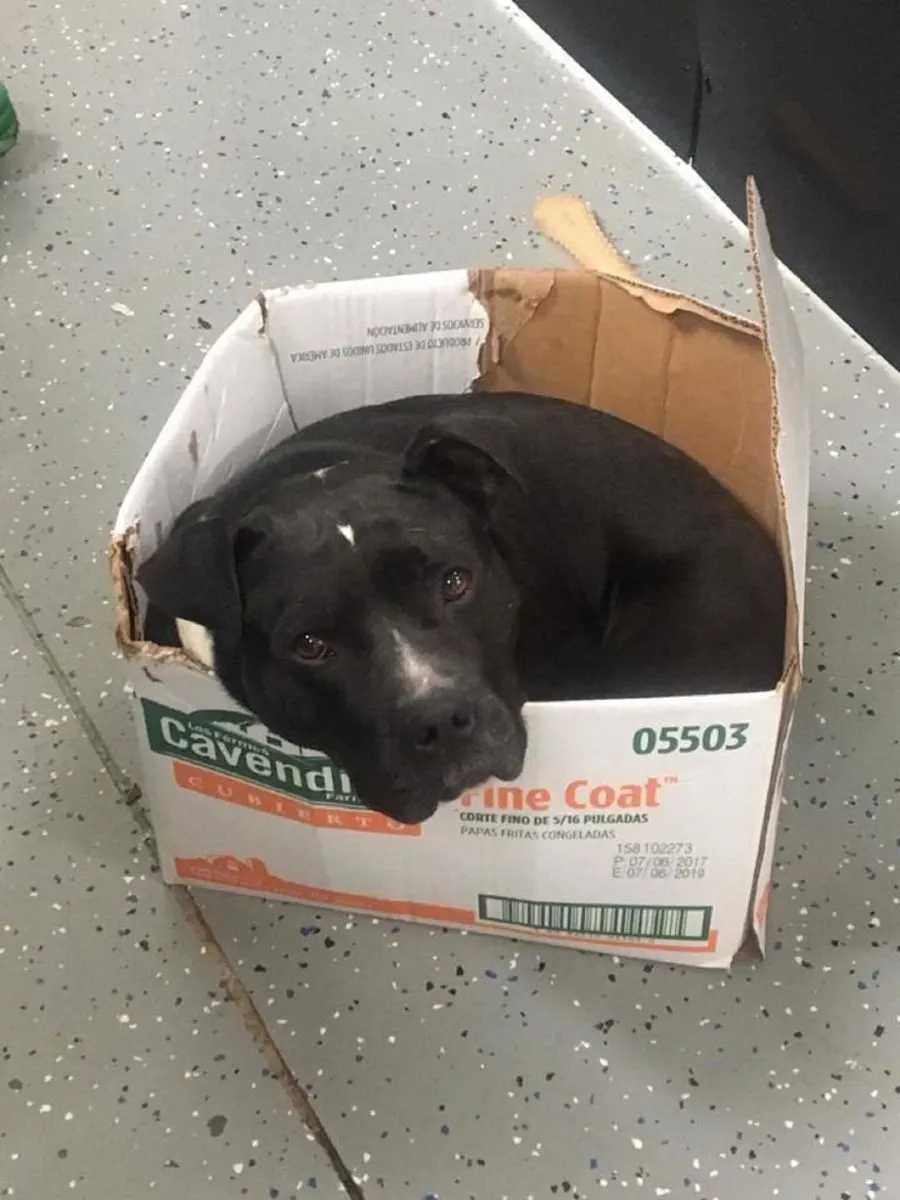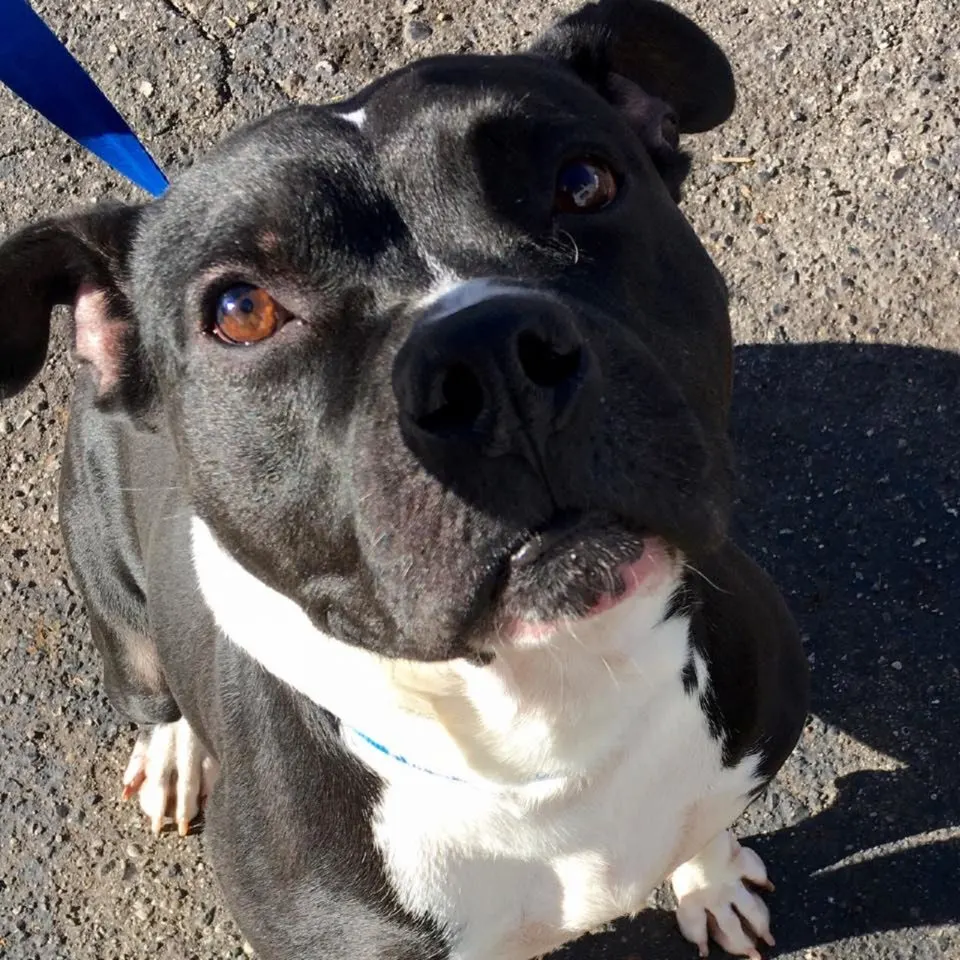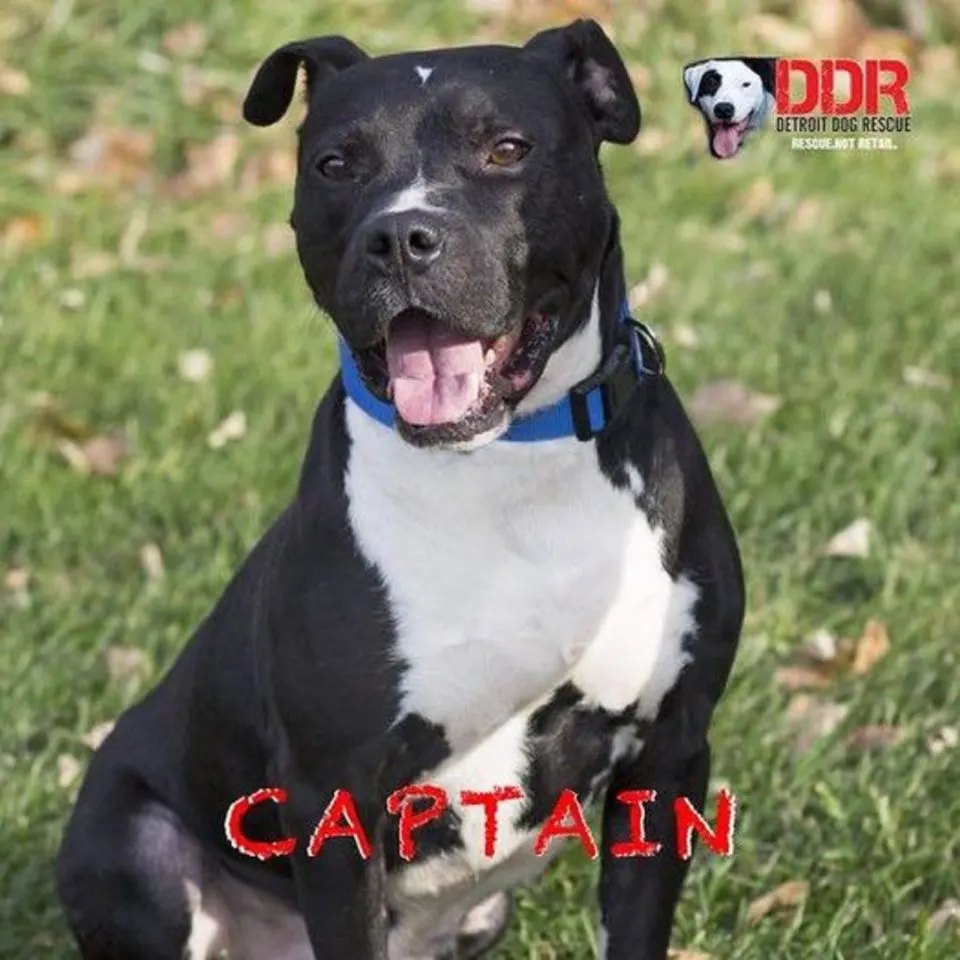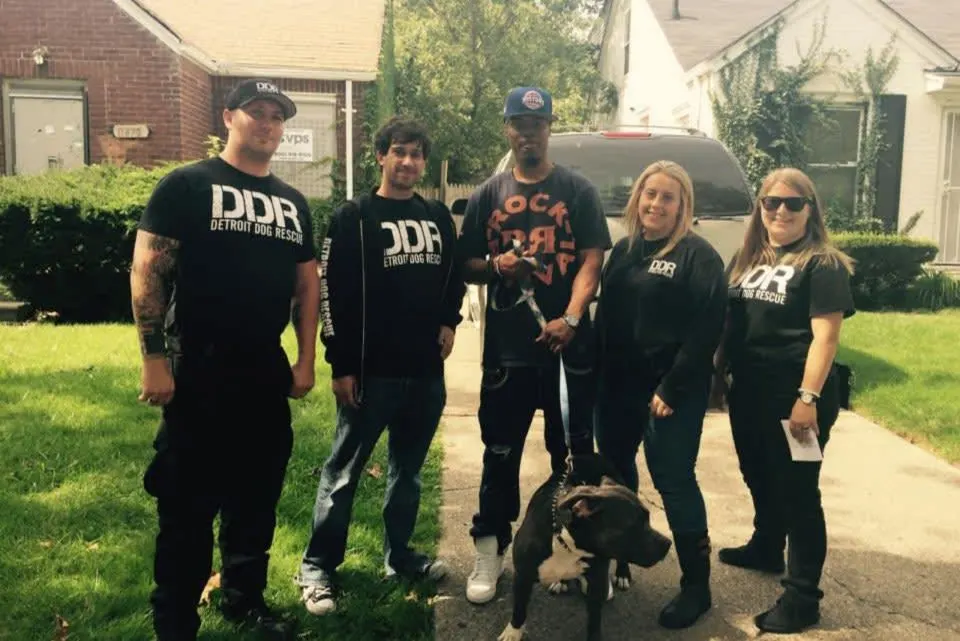Even when you save a dog from the street, it is sometimes really hard to break their old habits. That’s exactly what happened with Captain, the Pittie mix dog who was rescued from the streets of Detroit, Michigan.
When he was first brought to Detroit Dog Rescue, he was provided with endless care, love, and a beautiful, comfy bed – but all Captain wanted was his old cardboard box to sleep in!
A Cardboard Box Is The Most Comfy Bed For Captain

Captain’s story doesn’t have such a glamorous start. He was found as an abandoned dog who was seeking refuge in a comfy home, but he just couldn’t find it! Captain was wandering the streets of Detroit for too long – he was severely malnourished and he needed vet care.
“We can’t make them forget the time they were hit, kicked, shot, burned, or thrown out of a window. We can’t take away the time when the only warm bed they had…was a discarded cardboard box,” wrote Christina Rinaldi, the director of DDR, about Captain.
“We love you and your cardboard boxes, Captain.”
When he was first brought to the DDR facility, Captain was shy and didn’t have much doggo manners. But, all that was about to change…
He Had A Really Hard Life

Even though he’s now a good, socialized boy, Captain, according to Rinaldi, had a really rough life.
He was basically a dog that nobody wanted, which is why he was tossed away like garbage. His cardboard box was everything he had in this world and that’s why he was so attached to it.
“Captain came to us after being homeless on the street. He still prefers to sleep in a cardboard box, the same way he did when he was tossed away like garbage. We’ve continued to show him love, give him the best of everything…”
Feeling The Gentle Touch Of A Hooman Again

His old days of wandering around are finally over! This lovely Pittie mix has finally found the place where he can just relax and go all doggo, without worrying about being beaten, scared away, or starving!
He’s finally in the good hands of the c who are inclined to provide him with everything he needs.

Captain is up to date on his vaccines, he’s regularly checked up, and he’s neutered! On top of all that, Captain has finally learned some basic obedience commands! He’s truly a good boy, and a great listener who loves to work for his treats.
He’s a little bit shy around men, which is why the DDR team would prefer for Captain to be in a home with a female owner. He’s great with other canines, and after he properly settles in a new home, we’re sure that he’s gonna be the sweetest family Pittie ever!
We wish you the best of luck, Captain!
If you’ve ever been greeted by a fishy smell when your furry friend comes in for a cuddle, you’re not alone. Dog owners often wonder why their canine companions’ breath can sometimes take on a distinct aroma reminiscent of the ocean. It’s a common concern that can leave you wrinkling your nose in confusion.
You may find yourself pondering the reasons behind this peculiar phenomenon, wondering if it’s a cause for concern or simply a passing quirk. Understanding the potential causes behind why your dog’s breath smells like fish can shed light on their oral health and overall well-being. So, let’s sniff out the possible explanations together.
Understanding Your Dog’s Bad Breath
The Connection Between Diet and Breath
When it comes to your dog’s bad breath smelling like fish, one significant factor to consider is their diet. Just like in humans, what your dog eats can have a direct impact on their breath odor. If your dog’s food contains a lot of fish or fish oil, it can manifest in their breath. Try switching to a different protein source and see if their breath improves.
The Role of Oral Hygiene in Canine Halitosis
Oral hygiene plays a crucial role in your dog’s breath quality. If your dog’s teeth and gums are not properly cared for, it can lead to dental issues that result in bad breath. Dental problems such as tartar buildup, gum disease, or infections can emit odors that smell like fish. Regular brushing, dental check-ups, and appropriate chew toys can help maintain your dog’s oral health and keep their breath fresh.
Common Causes of Fishy Dog Breath
Anal Gland Secretions
Dogs have anal glands near their rectum that can sometimes emit a fishy odor when they are not emptying properly. This issue can lead to discomfort for your furry friend and result in bad breath. If you notice a persistent fish-like smell, it might be worth getting your dog checked by a veterinarian to address any concerns related to their anal glands.
Dental Issues and Gum Disease
Poor oral hygiene is a common cause of fishy breath in dogs. Dental problems such as tartar buildup and gum disease can contribute to foul odors emanating from your dog’s mouth. Regular dental care, including brushing your dog’s teeth and scheduling dental check-ups, is essential to prevent and treat these issues, helping to keep your dog’s breath fresh and pleasant.
Kidney Disease and Diabetes
Underlying medical conditions such as kidney disease and diabetes can also lead to a fishy smell in your dog’s breath. These conditions can affect your dog’s overall health and result in various symptoms, including changes in breath odor. If you notice persistent fish-like breath accompanied by other concerning signs, it’s crucial to consult with your vet for proper diagnosis and treatment to support your dog’s well-being.
Diagnosing the Fishy Smell
When to Visit the Veterinarian
If you notice your dog’s breath smells like fish and the odor persists despite regular dental care, it’s crucial to schedule a visit to the veterinarian. Persistent fishy breath may indicate an underlying health issue that requires professional diagnosis and treatment. Your vet can perform a thorough examination to identify the root cause of the unusual odor.
What to Expect During the Examination
During the examination for your dog’s fishy breath, the veterinarian will conduct a comprehensive evaluation to determine the possible causes. This may involve a thorough oral inspection to check for dental issues, including tartar buildup or gum disease. Additionally, the vet may assess your dog’s overall health to rule out underlying conditions such as kidney disease or diabetes that could be contributing to the unusual breath odor. By conducting a detailed examination, the veterinarian can provide an accurate diagnosis and recommend appropriate treatment to address the fishy smell.
Home Remedies and Preventative Care
Improving Oral Hygiene
To tackle your dog’s fishy breath, start by improving their oral hygiene. Regular brushing of your dog’s teeth using dog-specific toothpaste can help reduce plaque and bacteria buildup. Additionally, providing your dog with dental chews or toys designed to promote good oral health can assist in keeping their breath fresh. Ensuring proper oral hygiene is a fundamental step in addressing and preventing fish-like odors from your dog’s mouth.
Choosing the Right Dog Food
Opt for high-quality dog food options that are specifically formulated to promote good oral health. Look for brands that are rich in nutrients, contain limited additives, and aid in reducing tartar buildup. Some dog foods are even designed to help freshen breath. By selecting the right dog food, you can contribute to better overall oral hygiene for your furry friend, helping combat fishy breath effectively.
Regular Vet Check-Ups and Cleanings
Regular visits to your veterinarian are crucial for maintaining your dog’s oral health and addressing any underlying issues that may be causing their breath to smell fishy. During these check-ups, your vet can perform thorough dental cleanings to remove tartar and plaque buildup, identify potential dental problems early on, and rule out systemic issues like kidney disease or diabetes. Consistent vet check-ups and cleanings play a vital role in ensuring your dog’s breath stays fresh and healthy.
Professional Treatments and Solutions
Dental Cleanings and Treatment Plans
If your dog’s breath smells like fish, one effective professional solution is regular dental cleanings and treatment plans from your veterinarian. Dental cleanings involve removing tartar and plaque buildup on your dog’s teeth, which can contribute to foul breath. Your vet may also recommend a treatment plan tailored to your dog’s specific dental needs, ensuring a healthier mouth and fresher breath.
Managing Underlying Health Conditions
To address fishy breath caused by underlying health issues like kidney disease or diabetes, it’s crucial to consult with your vet for proper management. Your veterinarian can diagnose these conditions through tests and provide a treatment plan to help manage them effectively. Managing underlying health conditions not only improves your dog’s breath but also enhances their overall health and well-being.
Conclusion
So, there you have it! Your dog’s fishy breath could be due to various factors like diet, oral hygiene, dental issues, or underlying health conditions. Remember, maintaining your furry friend’s oral health is key to keeping their breath fresh. Regular vet check-ups and tailored treatment plans can help address tartar buildup and other dental needs. Don’t hesitate to seek professional help if you notice persistent fish-like breath in your dog. By taking proactive steps and addressing the root causes, you can ensure that your canine companion enjoys better breath and overall well-being. Stay informed, stay proactive, and keep your pup’s breath smelling sweet!
Frequently Asked Questions
Why does my dog have fishy breath?
Fishy breath in dogs can stem from various sources such as diet, poor oral hygiene leading to tartar buildup, anal gland secretions, dental issues, and underlying health conditions like kidney disease or diabetes. It is essential to consult a vet to identify the root cause and implement appropriate treatment for fresher breath.
How can I improve my dog’s breath?
To enhance your dog’s breath, focus on maintaining optimal oral hygiene with regular dental cleanings, tailored treatment plans, and addressing potential health issues like kidney disease or diabetes. Collaborate with a vet to create a comprehensive strategy tailored to your dog’s specific needs, ensuring fresh breath and overall well-being.
Why is veterinary attention crucial for resolving fishy dog breath?
Veterinary attention is vital for addressing fishy dog breath as it enables professional diagnosis of underlying causes like tartar buildup, dental problems, kidney disease, or diabetes. Vets can recommend tailored treatment plans, regular cleanings, and strategies to manage health conditions effectively, leading to fresher breath and improved oral health. Regular vet check-ups are essential for maintaining your dog’s overall well-being and ensuring long-term freshness in their breath.
[no_toc]

Hey there, I’m Janet Brooks, a dog-loving student from California. I’m all about helping pups in need, especially those without homes. Me and my awesome friends work together to give shelter and love to stray dogs. Oh, and I also write blogs about dogs to share helpful info.